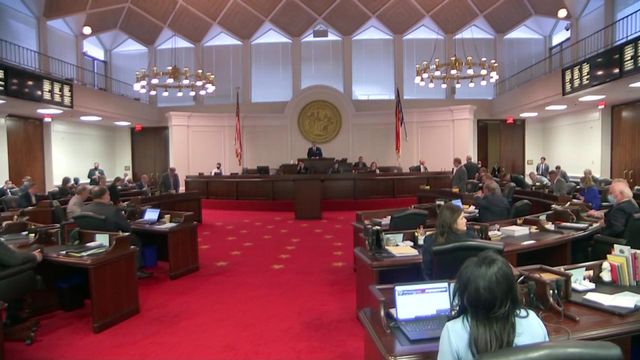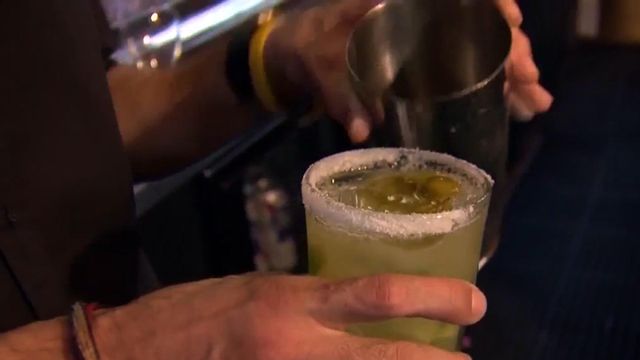NC House, Senate closer to agreement on $1.5 billion in COVID-19 relief
Final votes on the packages are expected Saturday.
Posted — UpdatedDetails on how the money will be spent are coming, but they're generally a mash-up of House and Senate priorities, most of which the Cooper administration backed. Lawmakers are still negotiating on a number of policy changes that will also be part of the final legislative package, and final votes are expected Saturday.
Senate President Pro Tem Phil Berger said the two sides have "still got a ways to go," but he was confident they'll get there.
"As far as sticking points, probably less than a dozen things," House Speaker Tim Moore said.
Cooper's secretary of Health and Human Services, Dr. Mandy Cohen, blessed the money deal during her daily afternoon briefing.
"I feel good about where folks have landed," she said.
One of the sticking points is a provision the House dropped into its bill this week to let restaurants sell mixed drinks with to-go orders. That has not gone over well with some Senate Republicans, and Berger said it may threaten the broad agreement leadership wants on the bill.
"After discussions with our members, I don't believe that it's in the best interest of coming forward with a consensus bill ... to include an alcohol provision," Berger, R-Rockingham, told reporters Friday.
Critics say to-go liquor would increase drinking behind the wheel and impaired driving. But House Majority Leader John Bell, who authored the mixed-drink provision, said that’s not how it would work.
"If people think they’re going to pull up and get a mixed beverage and put it in their cup holder and drive off, that’s not the case at all," said Bell, R-Wayne. "It’s sealed. It has to be put in the trunk, There’s parameters that are in place for it. [To-go sales are] already happening with the beer and wine – they can do this as well."
Most restaurants that serve liquor have thousands of dollars or more tied up in it – and they can’t sell it right now. Under state law, mixed drinks can be sold only on site, and all restaurants have been closed to dine-in service since March 17.
"They’re trying to be creative and flexible and find ways to continue to keep their employees on board, try to provide a service and keep their businesses alive," Bell said.
After this relief package is done, lawmakers will likely come back into session in a few weeks for a second round of spending. Moore, R-Cleveland, said House working groups will continue meeting remotely next week, as they have for the past several weeks.
"We still have roughly another $1.9 billion that we still have to appropriate as well," he said. "Right now, it’s going to be using this additional time to determine what those needs are, where that money needs to go."
The next session may address election issues, among other things. The State Board of Elections has asked for numerous changes, including money to sanitize polling places and buy more mail-in ballot envelopes, but General Assembly leadership said Thursday that they want to wait on those issues.
There's also building momentum to press Cooper on reopening plans, and Moore said some members have legislation to give counties more flexibility and speed up the process regionally. For now, though, he said the House is working with the governor, who is pursuing a statewide, phased-in approach with some reopening movement possibly starting next Friday.
Lawmakers will also wait to develop the regular state budget. Moore said Thursday that discussion, normally handled around this time of year, will probably hold until July to better assess the revenue hit state government will see from the virus-related recession.
He told reporters late Friday morning that the projected state budget shortfall could be $4 billion, which is more than the state has on hand in reserves.
Berger wrote Cooper last week, asking for 1 percent cuts in each state agency. Cooper has not yet laid out a cost-saving or budget plan for the rest of this fiscal year or the next one, which begins July 1.
A $4 billion shortfall would wipe out the state's reserves the "rainy day" fund and still leave a gaping hole in the budget.
That's why Berger wants to hold onto more of the relief funds in case they're needed to bail out the state.
"We are being told that some of this federal money, which right now cannot be used to help plug holes in our budget, could. The guidance is likely to change," he said.
Even the $1.5 billion agreement doesn't account for everything the state's involved with – there's another $1.2 billion flowing through state coffers that the legislature doesn't have to earmark. Other federal funds go directly to hospitals and other groups.
"Its really hard to keep track of how much is already going to hospitals, how much is already going to K-12 education," Berger said. "So I just want us to be careful that we're not double spending on some things when we might need some of that money down the road."
Related Topics
• Credits
Copyright 2024 by Capitol Broadcasting Company. All rights reserved. This material may not be published, broadcast, rewritten or redistributed.






